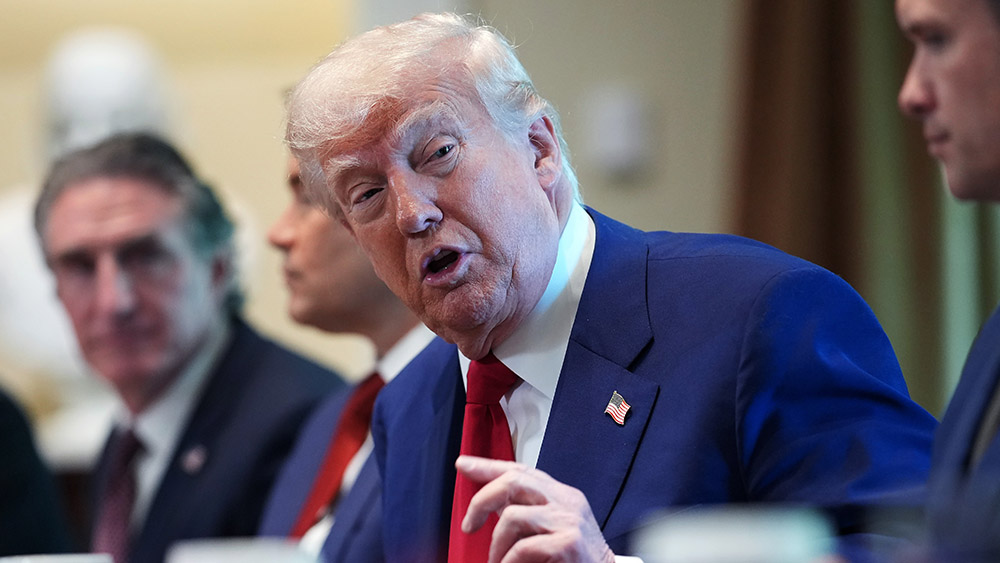Texas takes major step toward creating a Bitcoin reserve amid growing state-level crypto adoption
05/09/2025 / By Willow Tohi

- The Texas House Committee advanced Senate Bill 21 (SB 21) on May 7 with a 9-4 vote, proposing a Texas Strategic Bitcoin Reserve. If passed, Texas would be among the first U.S. states to create a sovereign Bitcoin reserve, signaling strong state-level crypto integration.
- The bill saw Republican support but faced Democratic opposition over concerns like regulatory risks and taxpayer exposure. Proponents argue Bitcoin’s stability and adoption justify the move, while critics warn of volatility.
- Initially Bitcoin-only, the bill expanded to include any digital asset with a $500B+ market cap (currently only Bitcoin qualifies). Supporters highlight adaptability to market evolution.
- Texas’ push contrasts with mixed approaches elsewhere (e.g., Arizona’s crypto reserve vs. Florida’s inaction). The bill reflects a broader trend of states experimenting with crypto in public finance amid federal stagnation.
- Passage could spur similar state-level adoption, reshaping institutional trust in crypto. Critics see risks, but advocates view it as a step toward financial decentralization. Governor Greg Abbott frames it as Texas leading innovation.
In a move signaling growing state-level support for cryptocurrency integration, the Texas House Committee on Delivery of Government Efficiency voted 9-4 on May 7 to advance Senate Bill 21 (SB 21), which proposes the creation of a “Texas Strategic Bitcoin Reserve.” The bipartisan split in a Republican-led chamber highlights the bill’s contentious yet momentum-driven progress. If passed by the full House and signed into law by Governor Greg Abbot, Texas would become one of the first U.S. states to formally establish a sovereign Bitcoin reserve, leveraging blockchain technology to diversify state assets.
Governor Abbott, who has openly championed crypto initiatives — including accepting Bitcoin donations for his 2014 campaign and declaring aspirations to make Texas the “crypto capital of the U.S.” — applauded the bill’s early success. However, the legislation now faces its final hurdle: a floor vote before the Texas legislature adjourns on June 2. Julian Fahrer, founder of Bitcoin Laws, a nonprofit advocating crypto policy reform, emphasized the urgency: “The clock is ticking, and stakeholders are watching closely for Texas to set a precedent for how states engage with digital assets.”
A fractured journey: From cryptocurrency-neutral to policy pioneer
SB 21 began as a purely Bitcoin-focused measure introduced by Republican Senator Charles Schwertner in January 2023. By February, however, the bill expanded to allow investments in any digital asset achieving a $500 billion market cap over 12 months — a threshold currently met only by Bitcoin, which holds a 1.3 trillion market cap. This flexibility, Rueben Cortez Jr., a Democratic committee member, argued during the hearing, “reflects the bill’s adaptability to evolving markets, not just a single currency’s whims.”
The legislation’s path to approval has drawn attention for its bipartisan divides. Four Democratic committee members opposed the bill, with concerns ranging from regulatory risks to inflationary impacts of cryptocurrencies. State Rep. Ana-Maria Salas (D) cautioned, “We’re talking about spending taxpayer funds on an unproven asset class; that’s a threshold we should cross with extreme scrutiny.” Proponents, however, argue that Bitcoin’s value, stability and global adoption justify the move.
Texas’ push contrasts with mixed responses elsewhere. Arizona recently signed legislation allowing unclaimed crypto to bolster its own reserve without taxpayer funds, while New Hampshire enabled treasury crypto investments. Florida, conversely, sidelined similar bills amid legislative awkwardness.
Why this matters: The ripple effect of state-coin experimentation
The Texas bill underscores a broader trend of states vying to define cryptocurrency’s role in public finance. Unlike federal policymaking, which remains stalled in regulatory uncertainty, state initiatives like Texas’ offer live experiments. They could inform frameworks for taxation, asset diversification and institutional oversight while navigating challenges such as price volatility and federal preemption risks.
Historically, states like California and Wyoming have led in regulating blockchain businesses, but Texas’ reserve proposal consciously aims to shape the crypto economy itself. By committing public funds, even modestly, Texas would mirror El Salvador’s 2021 Bitcoin adoption—a decision that ignited global debate over asset legitimacy.
Critics, including former Treasury Secretary Larry Summers, warn such moves risk taxpayer exposure. Yet pro-blockchain advocates, like Coin Center’s Jerry Brito, view Texas as emboldening a “financial decentralization” movement. “States are acting as laboratories of democracy,” he said in a recent statement to Coin Telegraph, “testing innovations that D.C. is too slow to consider.”
A new chapter for crypto, or just a fad?
As Texas’ legislature hurtles toward its June adjournment deadline, the fate of SB 21 holds symbolic and practical weight. For blockchain proponents, its passage could ignite a national wave of state-level crypto adoption, reshaping municipal finance and institutional trust in decentralized systems. For skeptics, it represents a gamble — one that could either stabilize state treasuries or expose them to wild market swings.
Ultimately, the bill’s success depends on overcoming lingering doubts about Bitcoin’s utility as a reserve asset. However, the fact that such legislation has reached this stage — and inspired parallel efforts across multiple states — reveals a tectonic shift in how public-sector leaders approach money’s future. Whether Texas becomes a crypto “lighthouse” or a cautionary tale, the experiment itself has already changed the national conversation.
Governor Abbott, already a crypto ally, has pledged rapid action should the bill clear its final vote. “This isn’t just about Bitcoin,” he remarked to local reporters after the committee’s approval. “It’s about Texas leading where others hesitate—again.” The world will soon learn whether the Lone Star State can turn rhetoric into fiscal reality.
Sources for this article include:
Submit a correction >>
Tagged Under:
big government, bitcoin, Bubble, cryptocult, dollar demise, economy, finance riot, financial decentralization, greater texan, Greg Abbott, money supply, pensions, progress, public funds, risk, Texas
This article may contain statements that reflect the opinion of the author
RECENT NEWS & ARTICLES
COPYRIGHT © 2017 PENSIONS.NEWS
All content posted on this site is protected under Free Speech. Pensions.news is not responsible for content written by contributing authors. The information on this site is provided for educational and entertainment purposes only. It is not intended as a substitute for professional advice of any kind. Pensions.news assumes no responsibility for the use or misuse of this material. All trademarks, registered trademarks and service marks mentioned on this site are the property of their respective owners.




















